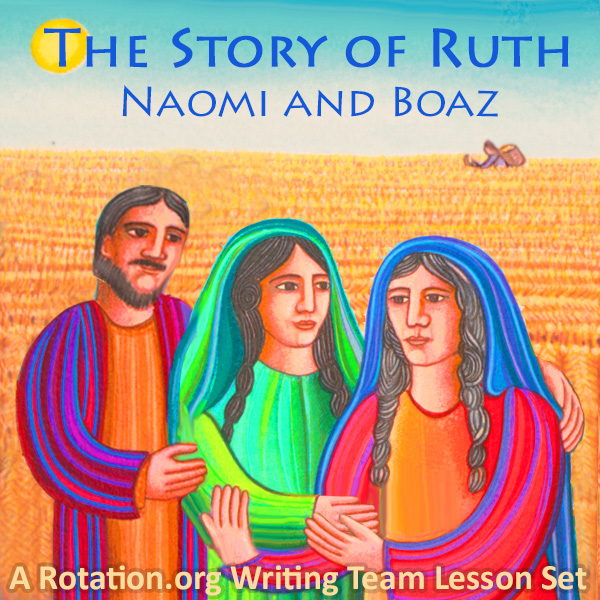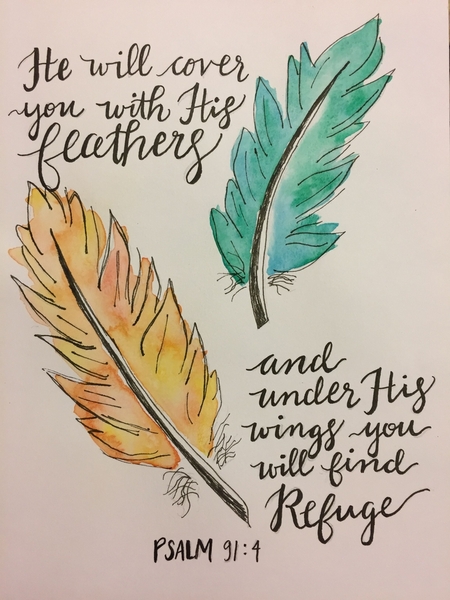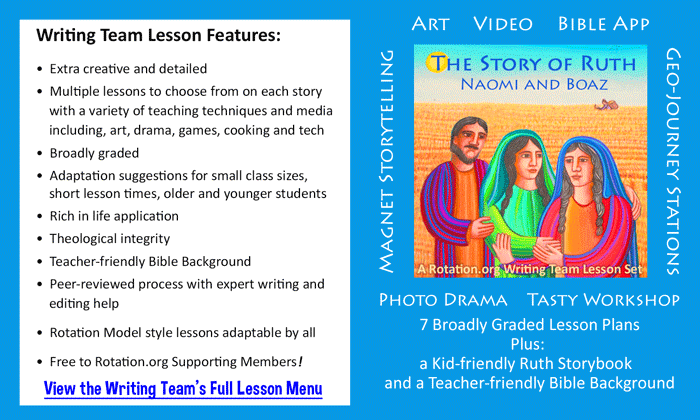Here's an excerpt from the Rotation.org Writing Team's Bible Background on
The Story of Ruth, Naomi, and Boaz
 View the full background here!
View the full background here! 

Scripture
The Book of Ruth
Memory Verse:
Where you go I will go, and where you stay I will stay. Your people will be my people and your God my God. (Ruth 1:16, NIV)
Themes:
Family, steadfastness, loyalty, honor, virtue, redemption, seeking protection and providing protection to others, just treatment of the poor and “foreigners.”
Summary of Meaning
The story of Ruth, Naomi, and Boaz begins as a story about steadfast love in the midst of tragedy and becomes an exemplary tale about two virtuous people who will become the great-grandparents of King David and the ancestors of Jesus. If you ever wondered how David became “a man after God’s own heart,” it started with Ruth and Boaz! Without mentioning God, their story is a subtle reminder of how God's redeeming work continues through redeeming people.
On a personal level, the Book of Ruth is a story about family, loyalty, and protecting those in need—subjects that are as relevant today as ever. Unlike stories of other flawed Bible heroes (Jacob, Moses, and David, for example), the Book of Ruth depicts good people living godly lives without miracles or God's voice telling them what to do.
On a historical level, the Book of Ruth was written to remind the exiles returning from Babylon (and all of us) that "foreigners," "immigrants," and the poor should be treated with respect, and indeed are part of God's family tree.
On a theological level, Boaz, Ruth, and Naomi's virtuous actions are a metaphor for God's relationship with Israel and an example to all of us. Eight different times in the Book of Ruth, Boaz is referred to as the Gaw-al' —a title that in Hebrew means "Guardian-Redeemer." Boaz is not only obligated by tradition to be the Guardian of his family, he goes out of his way to do so.
In addition to eight times in Ruth, the title of Gaw-al' is used 18 times in Leviticus and over 40 times in Isaiah to describe the role and work of God—our Guardian, Protector, and Redeemer. Like Boaz, God is our Guardian-Redeemer, the One who watches over us and the One to whom we humbly return seeking protection.
Importantly, among modern English translations, only the NIV properly translates "Gawal" as "Guardian Redeemer." Other English translations use the weaker and meaningless "kinsman" or "close relative" which only describes his relation to Naomi and Ruth, when in fact, it describes his RESPONSIBILITY to them as outline in the Law of Moses. 
Ruth also acts as a Guardian-Redeemer when she:
- pledges her steadfast love to Naomi, "Where you go I will go, and where you stay I will stay." (Ruth 1:16)
- accompanies Naomi on the difficult journey back to Bethlehem.
- gleans in the fields to provide for Naomi.
- knows that her marriage to Boaz will provide Naomi with security in her old age.
Naomi's acceptance of Ruth and willingness to bring her Moabite daughter-in-law back to Bethlehem is also exemplary.
Connecting the Guardian-Redeemer dots in this story and other places in the Old Testament, we can see the thematic origins of Jesus' message of inclusion, care, protection, and redemption.
Jesus' very last words in Matthew echo Ruth's to Naomi,"Lo, I am with you always, even to the close of the age." (Mt 28:20)
Learn more about the phrase and role of "Guardian-Redeemer" in the full background.
Why did Ruth ask to be "covered" by Boaz?
The Hebrew word translated as "covering of your garment" is Kaw-nawf, and literally means “wings.” Ruth is reminded Boaz of his blessing in Ruth 2:12 and his role as one who protects.
In chapter 3 when Ruth asks Boaz on the threshing floor to “Spread the corner of your garment over me” (Ruth 3:9), she is not asking Boaz to cuddle with her. Instead, in the Hebrew she literally asks Boaz to "spread his (protective) wings over me." The Hebrew word for "cover" used by Ruth is kaw-nawf.' Kaw-nawf is translated 74 other times in the Bible as “wings” --a metaphor for protection most often ascribed to God. In fact, Ruth is echoing Boaz's praise that he gave to Ruth in Ruth 2:12 when he says, “May you be richly rewarded by the God of Israel under whose wings you have to come to take refuge.” "Wings "can also be translated as "feathers." And of course, we know from nature both the protective and lifting role of feathers.
Hebrew readers would have heard this "wings" connection and undoubtedly recalled the words of Psalm 91 where the protective wings or feathers of the Redeemer are beautifully described:

Those who live in the shelter of the Most High
will find rest in the shadow of the Almighty.
He alone is my refuge, my place of safety;
he is my God, and I trust him.
He will cover you with his feathers.
He will shelter you with his wings.
His faithful promises are your armor and protection.
Psalm 91 (v 1, 2, 4 NLT)
Learn more about the Writing Team's 7 Creative Sunday School Lessons for Children at https://www.rotation.org/pages...et-for-sunday-school







